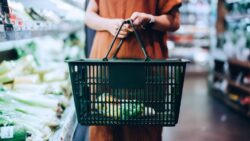Eggs and margarine drive food inflation to record 17.1%
According to research by Kantar, prices for food and drink in shops have hit record highs due to rising costs of milk, eggs, and margarine.
Grocery prices rose by 17.1% compared to the same period last year, the highest rate since Kantar started keeping records in 2008.
One in four shoppers is now struggling financially, and households may face an £811 increase in their annual grocery bill if they don’t alter their shopping habits.
Rise in food prices due to war
The conflict in Ukraine has disrupted the supply of grains, vegetable oils, and fertiliser, causing food prices to surge. Kantar reports that grocery price inflation is the second most important financial issue for the public, after energy costs.

Shoppers are trying to save money by switching to supermarket own-brands, which saw a 13.2% increase in sales in February, compared to a 4.6% increase in branded goods.
Basics nearly doubled
A BBC study revealed that some basic goods have nearly doubled in price over the past two years, with a small basket of 15 everyday essentials costing £5.34 more in 2023 than it did in 2021.
Commenting on the recent limits that supermarkets have been placing on fruit and vegetable sales, Fraser McKevitt, head of retail and consumer insight at Kantar said: “While 43% of all grocery baskets contain at least one fresh produce item, pack limits are unlikely to drastically affect consumers as we usually buy fruit and veg in smaller quantities.
“For instance, only 1% of tomato purchases last year involved more than three packs.”
Discount supermarket chains rapid growth
Discount supermarket chains like Aldi and Lidl have continued to see rapid growth, with sales increasing by over a quarter in the past year.
Meanwhile, online retailer Ocado reported that the average number of items bought per visit fell from 52 in 2021 to 46 last year, reflecting the Covid unwind and the UK cost-of-living crisis.
Ocado chief executive Tim Steiner said: “Ocado Retail, our UK joint venture with M&S, has shown its resilience against a backdrop of higher costs and smaller baskets, reflecting the Covid unwind and the UK cost-of-living crisis, by growing customer numbers and increasing online market share.”
Why is Britain facing a cost-of-living crisis?
There are several reasons why Britain is facing a cost of living crisis. One of the main factors is inflation, which has been rising faster than wages, causing the cost of goods and services to increase. The COVID-19 pandemic has disrupted global supply chains, causing shortages of goods and driving up prices. The rise in energy prices, which has been driven by a number of factors, including geopolitical tensions and supply chain issues, has also contributed to the cost of living crisis. The ongoing war in Ukraine has also contributed greatly to the rise in food prices.
In addition, the UK is facing a shortage of workers in key sectors, such as hospitality and logistics, which has caused wage inflation and contributed to rising prices. The impact of Brexit on the UK economy has also been a factor, with increased bureaucracy and tariffs affecting trade and supply chains.
Furthermore, changes to government policies and benefits have affected household incomes, with cuts to welfare benefits and changes to tax credits contributing to the cost of living crisis. Finally, rising house prices and rental costs have put pressure on household budgets, particularly for those on lower incomes.
Overall, a combination of factors has led to Britain’s cost of living crisis, making it more difficult for many households to make ends meet.





